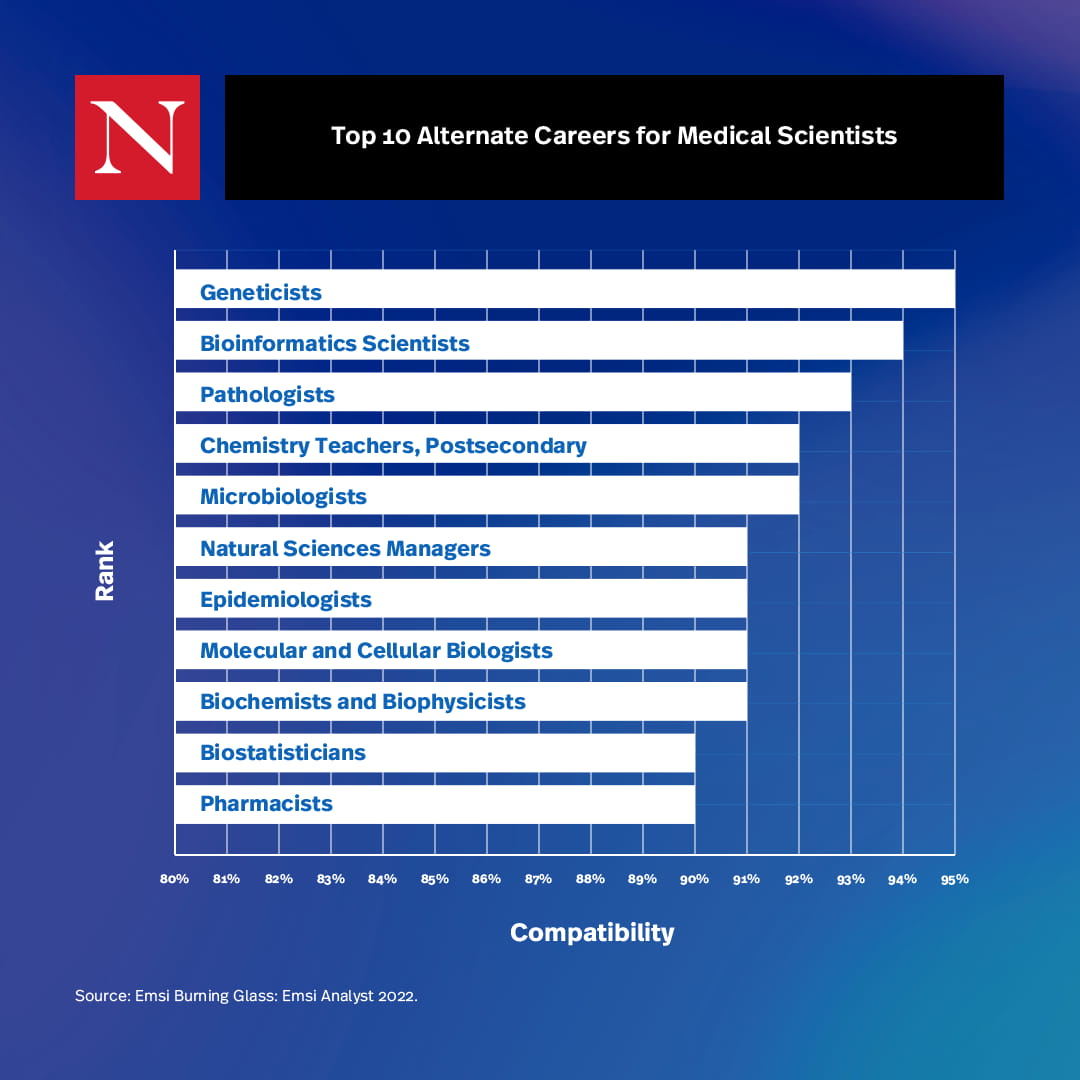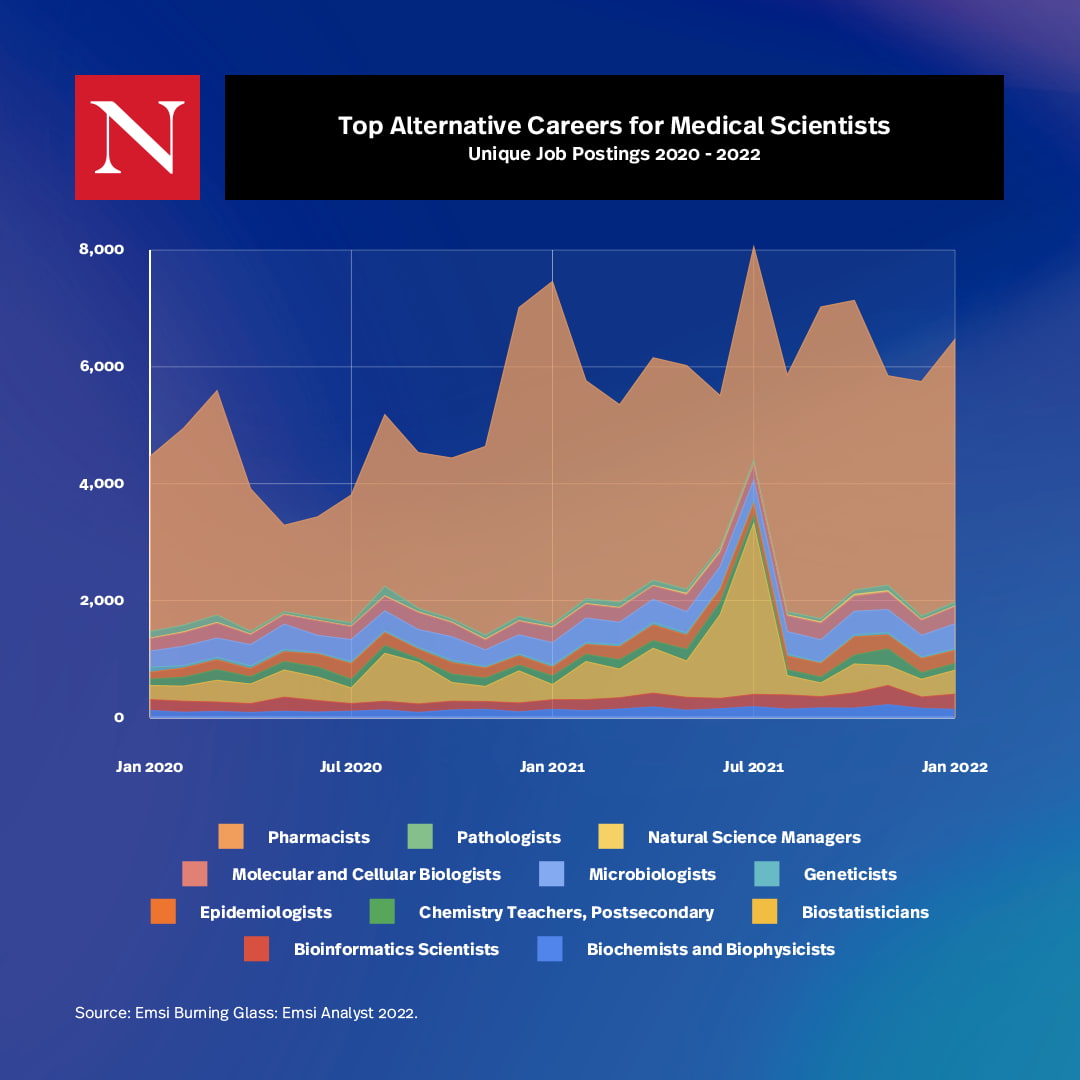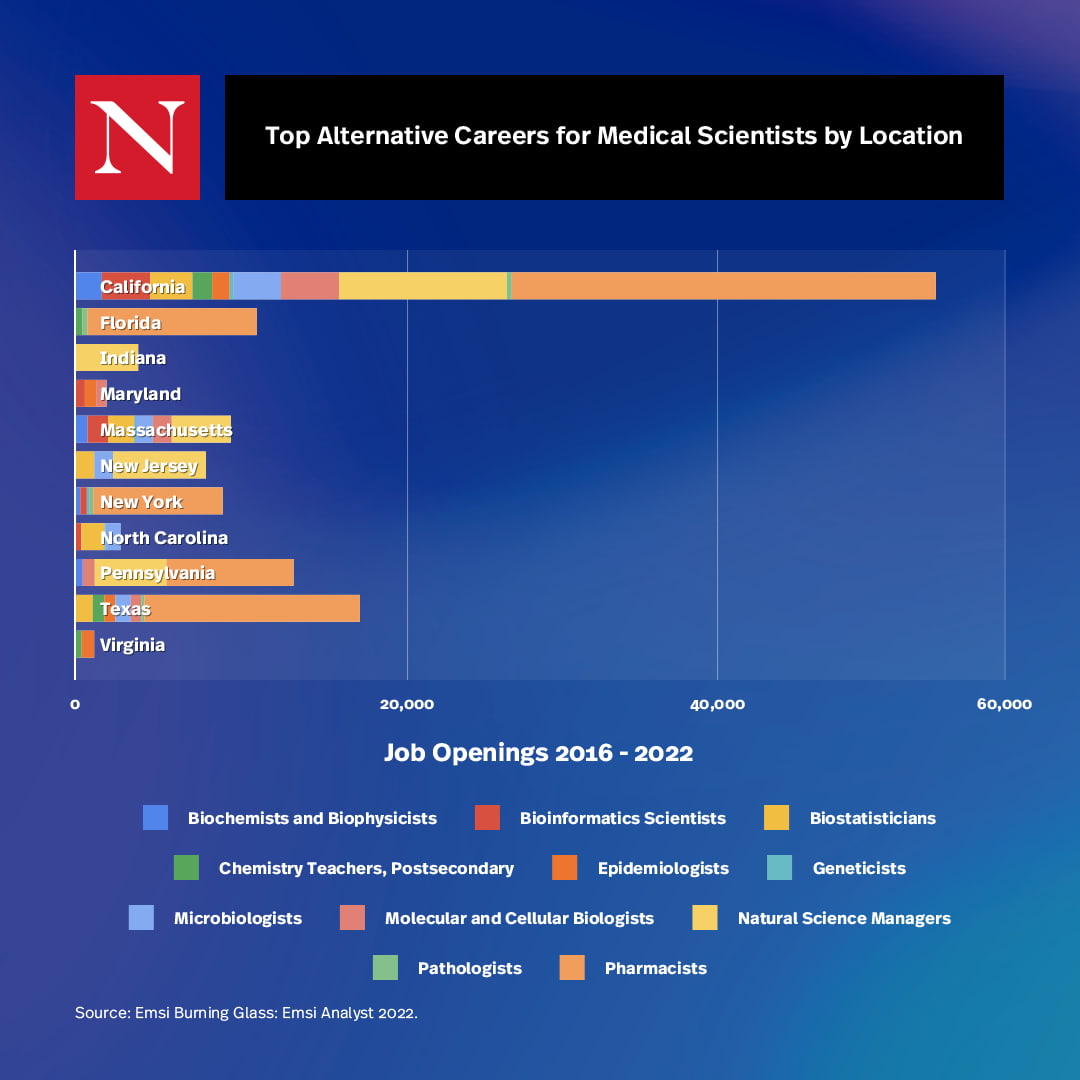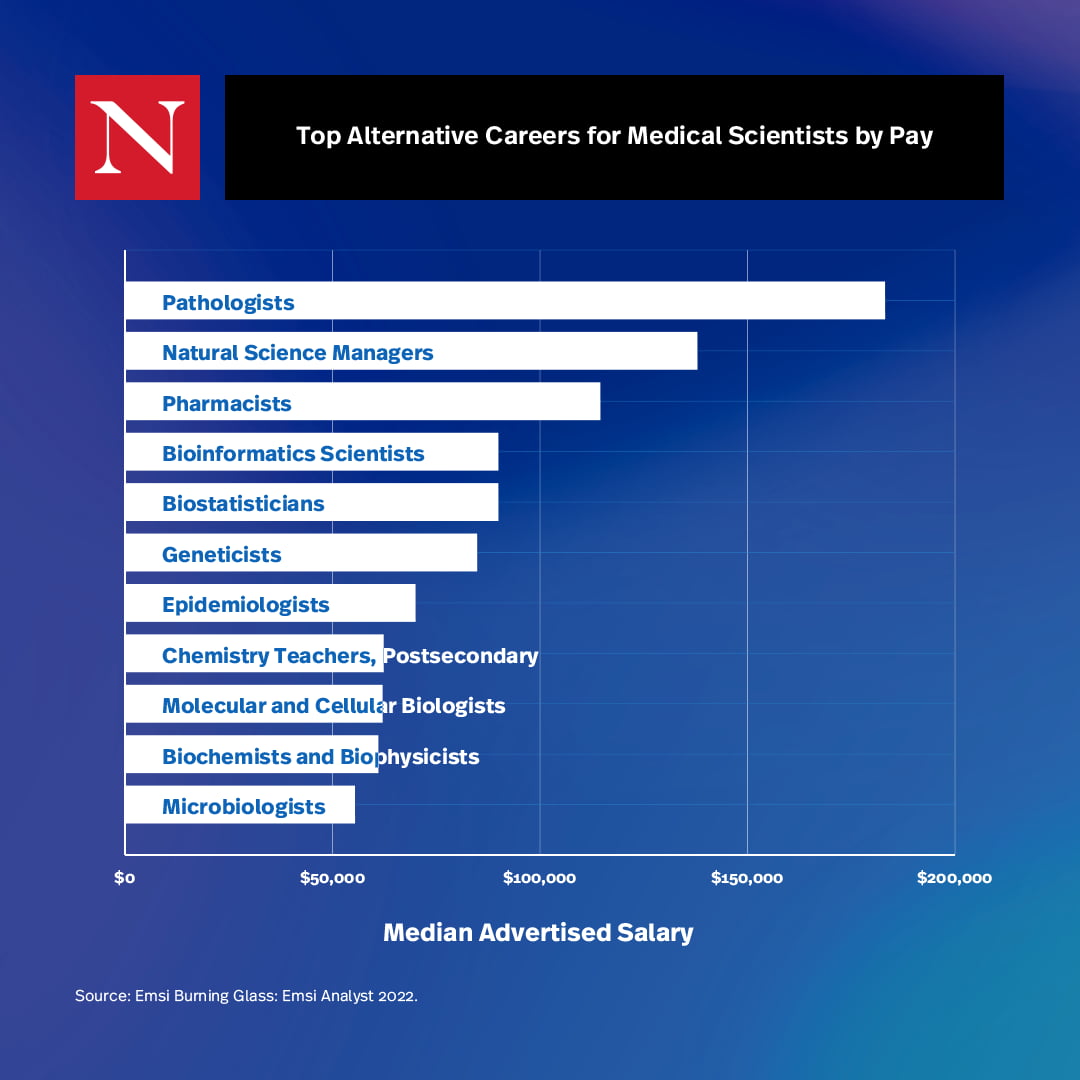There are many advantages to pursuing a career as a medical scientist. You can make a difference in others’ lives through research and clinical trials, all while earning a reasonable salary. However, the extensive educational requirements, higher salary opportunities outside of the field, or higher frequency of patient interactions may deter some. Regardless of the reason, if you’ve decided that a career as a medical scientist isn’t for you, here’s a list of several compatible occupations.
Compatible Occupations for Scientists

1. Geneticist
If you’re interested in research, a career as a geneticist may be perfect for you. A career in genetics is 95 percent compatible with a medical scientist. While most of the higher paying careers in genetics require a PhD, entry-level positions such as genetic technologist allow you to explore your interest in genetics without the extensive education—albeit with a lower salary. If you’re willing to put in the work for a PhD, however, you’ll have more autonomy to conduct research experiments to study heredity, as well as the mutation, aging, and overall impact of genes.
The minimum educational requirements to obtain an entry-level genetic technologist position are a bachelor’s degree in biology, chemistry, genetics, physics, or a similar major. Senior-level positions often require an advanced degree.
On average, geneticists make approximately $84,864 annually. However, the more education you complete, the higher your salary is likely to be. This is an excellent position to consider if you’re looking to get a foot in the door in the medical research industry.
2. Bioinformatics Scientists
At 94 percent compatibility, a career as a bioinformatics scientist is another viable option. A bioinformatics scientist uses technology and computer science to make molecular biology discoveries. In this position, you will have the opportunity to complete extensive research and study. It’s an excellent choice if you’re interested in a career that combines computer science with biology.
The educational requirements for an entry-level position in this field are less extensive than a medical scientist but more so than a genetic technologist. In addition to holding a relevant bachelor’s degree, bioinformatics scientists must have a master’s in bioinformatics, computational biology, or genomics.
The salary of a bioinformatics scientist is roughly equivalent to that of a geneticist. On average, they make $89,984 annually.
3. Pathologists
A pathology career is approximately 93 percent compatible with a medical scientist’s. Pathologists examine human bodies and tissue samples and perform a number of lab tests.
Pathologists are first required to earn an undergraduate degree in a science-related field. Following graduation, they need to take the MCAT test before entering medical school. The next step is to earn a Doctor of Medicine (MD) or a Doctor of Osteopathic Medicine (DO) degree. Additional training is required following this degree, including a four-year residency and possibly a two-year fellowship. The final step is to become certified through the American Board of Pathology (ABP).
This job’s extensive medical training is reflected in a high average salary of $183,168 per year. If your goal is to earn a high salary, a position in pathology provides that opportunity.
4. Postsecondary Chemistry Teachers
If you have a desire to share your scientific knowledge, becoming a postsecondary chemistry teacher is a viable option. Postsecondary teachers primarily teach chemistry in a college or university setting. Furthermore, this position is 92 percent compatible with a medical scientist’s.
In addition to an undergraduate science degree, chemistry teachers at two-year colleges typically require a master’s degree, while those who teach at four-year colleges usually need a doctorate or PhD.
On average, postsecondary chemistry teachers earn a salary of $62,336 annually.
5. Microbiologists
At 92 percent compatibility, microbiologists are the fifth most compatible position with medical scientists. This career also involves researching and studying microorganisms to discover how they live, grow, and interact with their environment.
Microbiologists require at least a bachelor’s degree in microbiology, biology, natural resources, or a related field. While additional education might increase your marketability, obtaining an entry-level position in the field is not required.
Several factors influence the salary of a microbiologist, but the majority average $55,424 annually.
6. Natural Sciences Managers
Are you looking for a career change after working in the science field for several years? You may want to consider becoming a natural sciences manager. This career path is 91 percent compatible with that of a medical scientist. These managers hold supervisory positions over a wide range of scientific professionals including chemists, physicists, and biologists. They oversee and coordinate research and development projects, quality control activities, and more.
This position is generally held by scientists who have spent years in the field and are looking for a change of pace. Therefore, the job requirements are typically based on experience versus a specific degree type. However, the majority of natural sciences managers hold master’s degrees or PhDs in a scientific field.
The experience required to become a natural sciences manager is reflected in the salary, which averages $137,946 annually.
7. Epidemiologists
If you’re interested in pursuing a career in public health, becoming an epidemiologist is a good option at 91 percent compatibility with medical scientists. While the job description of epidemiologists varies depending on the specialty they pursue, they’re generally responsible for discovering the cause of diseases and other health problems through the collection and analysis of data. They can also hold supervisory roles. This position involves a lot of communication with healthcare professionals as well as the public.
Epidemiologists must have a master’s degree in public health or a related field, with some positions requiring a doctorate.
They average a salary of $70,016 annually.
8. Molecular and Cellular Biologists
Molecular and cellular biologists are the eighth-most compatible occupation with medical scientists, at 91 percent compatibility. They’re responsible for researching and experimenting at the molecular level to understand how cells and molecules impact life.
This field requires applicants to hold a PhD in biochemistry, biology, physics, or other related fields.
Molecular and cellular biologists earn approximately $62,080 per year.
9. Biochemists and Biophysicists
A career as a biochemist or biophysicist is 91 percent compatible with that of a medical scientist. This field involves the study and research of various biological processes. Biologists and biophysicists work in a laboratory setting to understand cell development, disease, growth, heredity, and more.
While some entry-level positions require only a bachelor’s or master’s degree, biologists and biophysicists looking to work in an independent research-and-development capacity often require a PhD.
Biologists and biophysicists can find themselves earning a six-figure salary depending on their experience and education. On average, they earn an annual wage of $61,056.
10. Biostatisticians
Biostatisticians are tasked with the analysis of statistical data from biology-related medical research studies. They use this information to form conclusions and make statistical predictions. They also usually work in a collaborative setting with others in the field. This position is 90 percent compatible with medical scientists.
To earn an entry-level position as a biostatistician, applicants must hold at least a bachelor’s degree. The majority continue to earn master’s or doctorate degrees in the field to become more specialized and increase their earning potential.
Across the board, biostatisticians average $89,984 per year.
11. Pharmacists
The final career path on this list worth mentioning is a pharmacist. It’s approximately 90 percent compatible with the position of a medical scientist. Pharmacists provide patients with their prescribed medication and educate them on the risks and proper administration of treatments. This career path is an excellent choice for those looking to form relationships with their clients and coworkers.
Pharmacists need to earn a PharmD degree, as well as complete a one to two year residency and pass additional licensure exams. If you haven’t earned a bachelor’s degree, however, some schools such as Northeastern University’s School of Pharmacy and Pharmaceutical Sciences offer a direct-entry pathway that allows high school graduates to complete their PharmD degree in as little as six years.
Pharmacists enjoy a comfortable annual salary of $114,560.
Career Outlook in 2022
Your career path is dependent on more than just compatibility. Choosing a career path with a positive outlook is important. Here are some factors to take into consideration.
Job Growth Between 2020 and 2022
One of the factors you should consider when selecting a career path is industry growth. The positions that currently have the most job openings are:

- Pharmacists: 4,496 job openings as of January 2022, with a 50.16 percent positive growth rate.
- Microbiologists: 427 job openings as of January 2022, with a growth rate of 56.41 percent.
- Biostatisticians: 409 job openings as of January 2022, with a 69.71 percent growth rate.
Job Openings by Location in 2022
If you’re leaning toward a particular career path but want to know where the most opportunities are, here are the top four states for each career in terms of job openings.
- Geneticists: California, New York, Massachusetts, North Carolina
- Bioinformatics Scientists: California, Massachusetts, North Carolina, New Jersey
- Pathologists: California, Florida, New York, Texas
- Postsecondary Chemistry Teachers: California, Texas, Florida, Virginia
- Microbiologists: California, New Jersey, Massachusetts, Texas
- Natural Scientist Managers: California, New Jersey, Pennsylvania, Indiana
- Epidemiologists: California, Virginia, Maryland, Texas
- Molecular and Cellular Biologists: California, Massachusetts, Pennsylvania, Texas
- Biochemists and Biophysicists: California, Massachusetts, Pennsylvania, New York
- Biostatisticians: California, Massachusetts, North Carolina, New Jersey
- Pharmacists: California, Texas, Florida, New York

How to Choose a Career
Narrowing down your options isn’t a small task, and it depends on a variety of components, including your career goals, level of education, and how much money you’d like to make.
Consider Your Goals
It’s important to have a thorough understanding of your career goals before deciding on a final career path. For example, do you want a career where you can make a difference in the lives of others? Are you looking to increase your salary or obtain a better work-life balance? Or are you looking for a position with many career advancement and growth opportunities?
Education and Training Requirements
If you’ve previously held a position as a medical scientist, chances are you have completed much of the required coursework. If you haven’t yet entered the field and hold a high school diploma or undergraduate degree in a medical field, you’ll need to make sure you understand the educational requirements necessary for your desired career path.
Salary
One of the reasons the medical field is appealing to many is how much you can make in the industry. If you’re looking for a career with a comfortable salary, the highest paying compatible jobs are:

- Pathologists: $183,168 annually
- Natural Sciences Managers: $137,946 annually
- Pharmacists: $114,560 per year
Why Pharmacy Is an Excellent Option
While pharmacy may not be the most compatible occupation on the list, it’s an excellent choice for those looking for a job with growth potential and an excellent salary. There are several reasons obtaining a degree in pharmacy is worth the investment, including the versatility of the career, the high salary, and the relationships you form with your colleagues and clients.
If this sounds like a position that aligns with your goals and interests, the first step is to obtain a PharmD degree from an accredited college or university such as Northeastern University’s School of Pharmacy and Pharmaceutical Sciences. Interested in learning more? Take a look at our career guide detailing the steps necessary to become a licensed pharmacist.







Related Articles
PhD vs. Master’s in Biomedical Science: What’s the Difference?
10 Top Careers in Biomedical Science
What is Medicinal Chemistry?